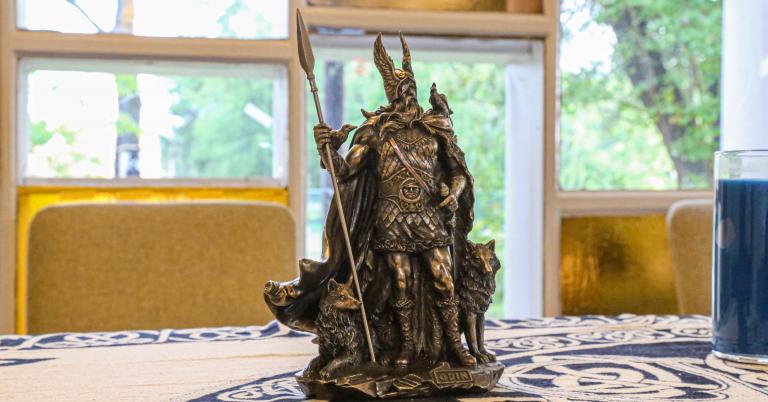Fellow Denton Pagan Linda Masten asked this:
What is imposter syndrome? How does it relate to religion generally, and Paganism specifically? What’s the cure?
Imposter syndrome is the self-doubt that what you do isn’t real or isn’t good enough – the fear that you don’t belong. It’s the feeling that you’re just faking it, and the fear that sooner or later someone is going to see through your charade and call you on it.
Here are two good articles on imposter syndrome. One is from the American Psychological Association. The other is from Psychology Today. That piece focuses on women, but it’s applicable to anyone.
At its core, imposter syndrome is a psychological phenomenon. If your problems with it are severe or persistent, you may want to consult a mental health professional – which I am not. But imposter syndrome in a religious setting is very common and rarely debilitating (though it can suck the joy out of our religious practices and experiences), plus I have both first and second hand experience in dealing with it. So I have some things to say about this that hopefully will be helpful. If this isn’t enough, you may want to see a professional.
There are two different ways imposter syndrome impacts our religious lives. The first is with doubts that the whole thing is real. The second is with doubts that we’re as good or as real as other people in our traditions and communities.
Imposter syndrome or ordinary doubts?
I’m not sure where imposter syndrome ends and ordinary doubts begin.
Our mainstream society is infected with the idea that religion is all about what you believe. That’s bad enough. Then fundamentalist Christianity insists you must believe that certain myths are literally true and that doubts are a sin. Meanwhile, militant atheists argue that since Christian myths aren’t literally true all religion is worthless.
That debate is a waste of time based on bad assumptions and we need not – and should not – participate in it. For most people throughout most of the world throughout most of history, religion was and is about what you do, who you are, and whose you are, not what you believe.
Most people go a lifetime without seeing a God with their physical eyes. In a society where religion is assumed to be literal, how could we not have doubts about Them?
Magic works by improving the odds, not by direct action. How can we ever be sure our magic really worked?
Nobody has proof. Most of us have experiences that lead us to believe these things are real, and a few of those experiences are strong enough they make it hard to doubt.
But not impossible. Not for me, and if they were being perfectly honest, not for the vast majority of deeply religious people across the religious spectrum.
It’s good to have these doubts. Doubts keep us humble. Doubts keep us honest.
Is it fraud to practice a religion when you aren’t sure the beliefs it teaches are true? Only if you think belief is the essence of religion.
And for Pagans – and pretty much everyone else besides fundamentalists – it isn’t.
If you feel like an imposter for practicing a religion you aren’t 100% sure is true, you’re playing by the rules of a different religion.
“Other people’s Paganism / witchcraft is so much more than mine”
This, I think, is more of a problem for most of us than the doubts discussed above. How can I be a real Pagan when I don’t do all the things I read about on the internet? How can I be a real polytheist when I’ve never had the ecstatic experiences some people talk about? How can I be a real witch when I don’t look like the Witches of Instagram?
Particularly with witchcraft (but also with our encounters with the Gods) we’re already influenced by what we see and read in movies and fiction. We know we can’t do things like that, but when we hear something that sounds a lot closer to it than anything we’ve ever done, we start to wonder if something is wrong with us.
It’s good to talk about our spiritual experiences – especially the strange ones. Most of us have them, but we suppress them or rationalize them away because we’re afraid of people thinking we’re crazy… or thinking that we’re lying. When one person shares their experiences, it reminds the rest of us that we’re not crazy – and we’re not alone.
But I don’t believe every story I hear. Sometimes the story is just too implausible. Sometimes the storyteller isn’t believable. Sometimes it sounds good, but then I do some divination and alarms start going off.
The more people make it about themselves – especially when they start talking about “gifts” and “bloodlines” stuff like that – the less I’m inclined to believe them. When they talk about how cool these things are and not about the responsibilities that come with them, I’m really inclined to think they’re making things up… or that they’re about to come crashing down when the reality of it all smacks them in the face.
Setting realistic expectations
Even if what we hear from others is the absolute truth, it’s only a snapshot of a moment in someone’s life. The other 99% of the time their lives are as ordinary as anyone else’s. If we’re not careful we can judge our ordinary days by someone else’s once-a-year or once-in-a-lifetime days. That can lead to imposter syndrome.
Real religious experiences are usually subtle. Often they’re ineffable, not because it’s forbidden to speak of them but because they can’t be adequately expressed in words. If we set our expectations based on other people’s peak experiences – or worse, on the lies and exaggerations of egomaniacs – we can overlook the wonder and awe of Nature, the whispers of the Gods, or the tiny bit of magic that pushed us over the line from failure to success.
“I’m really a bad Pagan”
For some people, imposter syndrome is less about the experiences they do or don’t have and more about how they actually practice their religion. They’re left with the idea that all “real” Pagans know the current phase of moon at every moment or only eat organic food or do this or that practice on a regular basis.
A couple years ago Jason Mankey wrote Bad Witch: Things Other Witches Do That I Don’t. Jason would be the first to tell you he’s not the model for what a witch or a Wiccan or a Pagan should be, but if someone with his experience and knowledge doesn’t do all these things, why should any of us feel like we have to?
I frequently rant against the idea that Paganism is whatever you want it to be. The Pagan movement may not have hard boundaries, but some things are inside our Big Tent and some things aren’t. Still, there is no One True Way.
More than that, there is room in our religions for people at all levels of commitment and participation. My religion is not just for mystics and priests – it’s also for accountants and auto mechanics, for people who just want to honor the Gods and live virtuous ordinary lives.
We are not all called to do the same things. Our wider community is best served by participants from many walks of life, filling many roles, in many different ways.
Find your place, where ever it may be.
Focus on your practice
What’s the cure for imposter syndrome? For me, it’s a question of responsibilities. I’m responsible for doing what I’ve been called to do. Or if you prefer, I’m responsible for doing what I know I need to be doing, here and now.
That starts with daily spiritual practice. It includes my weekly, monthly, and seasonal devotions and celebrations. It’s writing about what I do and teaching what I know.
If someone else has deeper devotions, bigger rituals, or writes more books, good for them – that helps our wider movement. If I really want to be more like them, then I have to be willing to do what they do (writing books is hard!). And in some cases they may have talents and abilities I simply don’t have. I’ve made myself into a good speaker, but I’m never going to be a great speaker – I don’t have the natural talent for it.
A successful religious movement needs people filling many roles at many levels of expertise and commitment. They are all necessary and beneficial, and they’re all real.
If it helps, it’s real
Is all of this real? Am I a real Pagan and a real Druid? Am I as valid as the people I look up to? If you give me enough whiskey to remove all my inhibitions, my answer will be “I don’t know.”
But here’s what I do know. My experiences are real. My magic works well enough and often enough that I keep doing it because it helps.
Mainly, my life is orders of magnitude better since I started following this Pagan path. My desire to keep following this path and to take it farther and deeper is greater than my fear of feeling like I’m faking it all.
It helps. That makes it all real enough for me.
Watch “The Fraud Police”
This video is musician Amanda Palmer’s 11-minute commencement speech to The New England Institute of Art in 2011. Whatever you think of Amanda Palmer as a musician or as a performance artist, she is 100% right in this speech. I watch it at least once a year – it’s the best “urgent care” for imposter syndrome I’ve ever found.


















